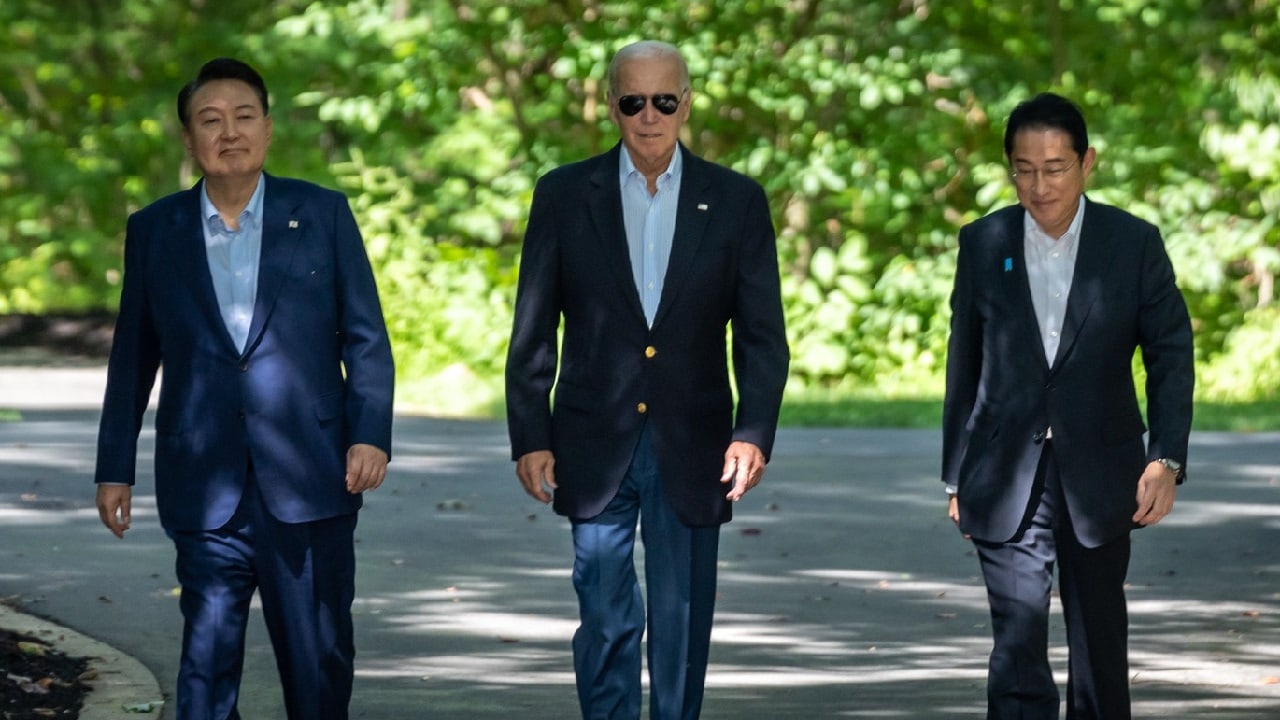On Aug. 18, Japan, the Republic of Korea, and the United States held a summit. The meeting itself was remarkable — few observers would have expected anything like it before the election in South Korea of President Yoon Suk Yeol. The summit fulfilled one of the major lines of effort of the U.S. Indo-Pacific strategy: Expand U.S.- Japan-ROK cooperation.
The summit resulted in three incredibly substantive agreements. They aim to institutionalize security, economic, and diplomatic coordination and cooperation to ensure the long-term strength of this trilateral arrangement.
No Asian NATO but Enhanced Hub-and-Spoke
Some critics, notably China, decry the trilateral cooperation as a U.S. attempt to create an Asian NATO. That is not the intent. The reality is that the U.S. is reshaping its “hub and spoke” alliance structure into a networked framework. This features a number of expanded hubs while maintaining multiple bilateral connections, or spokes, throughout the region. There is AUKUS and the QUAD, plus NATO and the Asia Pacific Four, all of which can be considered hubs. This replaces a structure where the U.S. acts as the only hub, directing the spokes of bilateral alliances and partnerships. The arrangement enhances the security of like-minded democracies who seek to protect the rules-based international order from an axis of authoritarians comprising China, Russia, North Korea, and Iran.
Three Substantive Documents
Three main documents were promulgated at the summit. They are designed to establish the consultative framework, set forth the principles for cooperation, and provide a way ahead for what could be unofficially called “JAROKUS.”
The Commitment to Consult simply reinforces what is already codified in the ROK-U.S. and Japan-U. S. mutual defense treaties. Both treaties require consultation when faced with threats and call for each nation to follow its constitutional processes for action. There is no equivalent of NATO’s Article 5. The new commitment calls for high-level trilateral consultations.
The Camp David Principles is a commitment to “a free and open Indo-Pacific trilateral security cooperation … to promote and enhance peace and stability throughout the region.”
Finally, the Spirit of Camp David provides a framework for cooperation across the security, economic, and diplomatic domains. It commits to “a peaceful and prosperous future for our people, and the people of the Indo-Pacific.”
These documents are substantive and likely the result of the long, hard work of diplomats and national security professionals working for months to solidify a functional and lasting trilateral relationship. They cover a lot of ground, and the substance makes them more than aspirational.
Good But Not Complete Press Coverage
Generally, the press coverage has been positive, and much detailed analysis has been provided by national security experts and Korea watchers. However, as happened after the April 26 summit between Yoon and U.S. President Joe Biden, one key point in the documents has been overlooked. That is the statement that all three nations support “a unified Korean Peninsula that is free and at peace.” While this could be expected from Biden and Yoon, it is very significant that Japanese Prime Minister Fumio Kishida agreed with a free and unified Korea — an end result that should be described as an acceptable, durable, political arrangement that will sustain, protect, and advance the interests of all three nations.
Some may consider this statement a throwaway, an aspiration not meant to be taken seriously. However, it is enshrined in two key summit documents. It reflects a shared realization that North Korean leader Kim Jong Un is unlikely to end his nuclear program. Therefore, rather than insisting that denuclearization must come before unification, South Korea, with the support of Japan and the U.S., should pursue unification as the path to ending the threat from North Korea and halting Pyongyang’s crimes against its own people.
A New Trilateral Path Forward
JAROKUS has an opportunity now to build on the summit and develop a new strategy for the Korean peninsula. That strategy must be based on a human-rights-upfront approach, an information and influence campaign, and the pursuit of a free and unified Korea, as described by a working group led by Ambassador Robert Joseph.
Although denuclearization of the North remains a worthy goal, it will not happen so long as the Kim family remains in power. Kim’s political warfare and blackmail diplomacy strategies completely failed in 2022 because Yoon and Biden, like their predecessors, refused to make the political and economic concessions he demanded just to come to the negotiating table — namely to remove sanctions. Now it is time for Seoul, Tokyo, and Washington to execute a political warfare strategy that flips the conventional wisdom and seeks unification first.
The only way to end North Korea’s nuclear program and its human rights abuses is through unification of the Korean peninsula. Following the Camp David Summit, JAROKUS can maintain the highest state of military readiness to deter war. They can then pair a human-rights-upfront approach with a comprehensive information activities campaign to focus on Korean unification. The approach must aim at securing a stable, non-nuclear, economically vibrant Korean Peninsula unified under a liberal, constitutional form of government based on freedom, individual liberty, free market principles, the rule of law, and human rights as determined by the Korean people. It must be a free and unified Korea — a United Republic of Korea.
David Maxwell, a 1945 Contributing Editor, is a retired US Army Special Forces Colonel who has spent more than 30 years in Asia and specializes in North Korea and East Asia Security Affairs and irregular, unconventional, and political warfare. He is the Vice President of the Center for Asia Pacific Strategy and the editor of Small Wars Journal. He is a Senior Fellow at the Foundation of Defense of Democracies and the Global Peace Foundation (where he focuses on a free and unified Korea).

